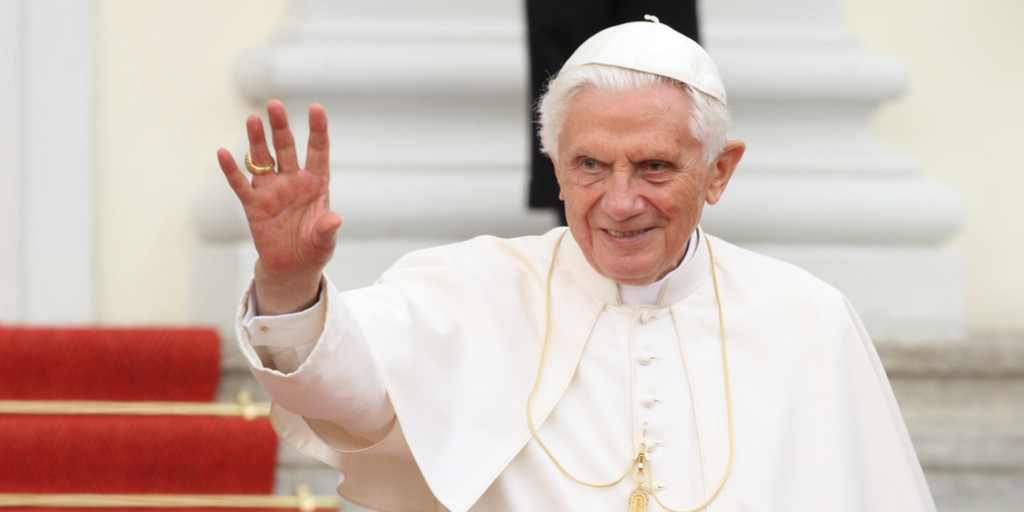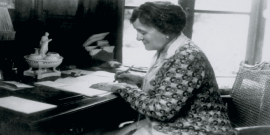Benedict XVI’s Republic of Reason
Ten years ago, and 66 years after Berlin was stormed by the Soviet army, not far from the bunker in which the Führer of the Thousand Year Reich committed suicide, a German pope addressed the Bundestag of the Federal Republic of Germany. His speech, “The Listening Heart: Reflections on the Foundations of Law,” amounted to a call to the assembled legislators to escape another bunker.
That bunker was an enclosed state of mind. Far from being a refuge from danger, it was one that cut itself off from the fullness of reason and those truths given expression in religious faith. And by faith, Benedict XVI did not mean the type of beliefs that lead people to fly planes into buildings. Instead, the pope had in mind a faith grounded in a conception of God as Caritas but also Logos: the ancient Greek word that embraced the idea that God is a rational Divinity and the ultimate foundation of human reason itself.
A decade after Benedict laid out his case in 2,666 words, his text repays careful reading. It takes us to the heart of much that is wrong with the way that law is understood today, especially in countries marked by the civilization of the West.
Regensburg Secundae
Benedict’s 2011 Bundestag speech did not attract the same attention as his Regensburg address, also delivered in Germany six years earlier. That text had asked necessary albeit unfashionable questions about particular expressions of Islamic thought, but even harder questions (noted by those who actually read the pope’s words) about why particular intellectual pathologies were eating out Western civilization. This time, the topic was narrower: how the foundations of law were becoming undone because of the same crisis of reason highlighted in the Regensburg address.
Benedict began by asking the assembled legislators of the country at the heart of the twentieth century’s traumas this question: What should be the foremost quality desired by those responsible for lawmaking? His answer wasn’t empathy, tolerance, or a commitment to diversity. Instead, the pope turned to the Hebrew Scriptures, specifically the First Book of Kings, in which Solomon asked God, in the pope’s words, for “a listening heart so that he may govern God’s people, and discern between good and evil.”
By “listening heart,” Benedict meant wisdom. And ancient Israel’s conception of wisdom wasn’t pragmatism, shrewdness, or utility-calculation. It was intimately concerned with knowing the difference between right and wrong and acting accordingly. Moreover, the Hebrew Scriptures make it clear that wisdom isn’t just a human potentiality. Its origins and nature are ultimately divine: “The Lord gives wisdom” (Prov.2: 6). Wisdom for the Jews involved deep understanding and was particularly associated with justice: hence, its identification with the Mosaic Law and keeping God’s commandments (Ecc.1:26-28). Humanity’s advancement in wisdom, Israel’s prophets emphasized, was enriched by observing the natural world (Prov.6:6), history (Deut.32:29; Hos.14:10), and consciousness of the fact that God gave humans a nature unlike any other created being (Job 35:11).
Judaism’s revolutionary association of wisdom with the divine, true justice, and reason’s innate knowledge of good and evil wasn’t lost on the first Christians. The attention given to wisdom’s divine origins led Rabbi Saul of Tarsus to highlight the difference between purely human knowledge and God’s wisdom (1 Cor.1:17–31). Paul’s teaching was one reason why, Benedict informed the German parliamentarians, Christians didn’t propose a political order immediately derived from Revelation. Wisdom, for Christians, couldn’t be reduced to political or judicial rules.
But, Benedict cautioned, Christians weren’t in the business of dispensing with law, including the commandments contained in the Torah (let alone disparaging obedience to such commandments as “rigidity”). Instead, they viewed human nature and reason “in their interrelation as the universally valid source of law” and as reflecting that same wisdom contained in God’s Revelation to the Jewish people. In Benedict’s words,
This step had already been taken by Saint Paul in the Letter to the Romans, when he said: “When Gentiles who have not the Law [the Torah of Israel] do by nature what the law requires, they are a law to themselves . . . . they show that what the law requires is written on their hearts, while their conscience also bears witness” (Rom 2:14f.). Here we see the two fundamental concepts of nature and conscience, where conscience is nothing other than Solomon’s listening heart, reason that is open to the language of being.
This brought Christians close, the pope stated, to the idea of natural law as expressed by Stoic philosophers whose conception of Logos had come “into contact with leading teachers of Roman Law.” Here was a way for all people to understand how to act wisely and justly.
Acknowledgment of universal moral truths knowable through reason by believers and non-believers alike was especially important, Benedict commented, if politics and law were not to degenerate into barbarism. To underscore the point, Benedict cited Augustine’s famous line: “Without justice—what else is the State but a great band of robbers?” That, the pope pointedly added, was a lesson that the German people had to offer the world in the wake of the Nazi catastrophe. “We Germans,” he said, “. . . have seen how power became divorced from right, how power opposed right and crushed it, so that the State became an instrument for destroying right—a highly organized band of robbers, capable of threatening the whole world and driving it to the edge of the abyss.”
The Positivist Turn
Continuing his pivot from ancient sources to modern times, Benedict argued that the connection between natural law and justice was well-understood by many Enlightenment thinkers and reflected in documents like the 1948 Universal Declaration of Human Rights. Produced partly in reaction to the horrors unleashed by National Socialism, this text was composed by individuals ranging from a secular French Jew, René Cassin, to the Lebanese Greek Orthodox diplomat, Charles Malik.
The expression “natural law” appears nowhere in the 1948 Declaration. Some of its articles are more evocative of mid-twentieth-century social democracy than Aquinas. Yet the text’s reference to the “inherent dignity and of the equal and inalienable rights of all members of the human family” and its claim that all humans are “born free and equal in dignity and rights” and “endowed with reason and conscience” imitate the language of natural law, albeit one tinged with Enlightenment emphases. The fact, however, that the Declaration was drafted and endorsed by believers and non-believers itself illustrated that some principles are recognizable by all humans as true.
But this confidence in reason’s ability to know truth, Benedict went on, was now in question. The twentieth century’s second half, he said, had witnessed the triumph of “a positivist understanding of nature” throughout the West.
By “positivist,” the pope meant the idea that reason can only know scientific and social facts. Philosophy and religion were subsequently demoted to the sphere of the subjective. The West had consequently cordoned itself off from “the classical sources of knowledge for ethics and law”—and trapped itself in what Benedict called “a concrete bunker with no windows, in which we ourselves provide lighting and atmospheric conditions, being no longer willing to obtain either from God’s wide world.”
How then do we escape this self-imposed prison? “How,” Benedict asked, “do we find our way out into the wide world, into the big picture? How can reason rediscover its true greatness, without being sidetracked into irrationality?”
Benedict showed how a religious figure can engage with modern thought in a manner respectful of modernity’s accomplishments in areas ranging from jurisprudence to the natural sciences, while being unafraid to highlight modernity’s real shortcomings and deficiencies.
To be clear, Benedict was not suggesting that there wasn’t a positivist dimension to law and politics. Knowing and expressing moral truth is one thing but expressing those truths in legislation necessarily involves consideration of other facts and context. There are legitimate reasons why positive law varies enormously across jurisdictions. Hence, Benedict noted, “the question of what now corresponds to the law of truth [and] what . . . may be given the force of law is in no way simply self-evident.”
This analysis reflects some basic axioms of natural law. Certainly, natural law holds there is no such thing as morally neutral man-made laws. Even when a law seems completely procedural, it always contains a moral logic which always makes such a law more than simply a social fact and allows us to assess its justice. The reason that something as mundane as traffic laws regulate millions of people’s driving choices is that goods like human life and health are put at unreasonable risk without such laws. When we obey traffic regulations, we implicitly embrace that moral rationale. Yet while natural law insists that there are moral absolutes which may never be violated (don’t steal, don’t kill, etc.) and certain goods to be promoted (life, truth, etc.), it recognizes that there is room for prudence in how we cash out natural law principles in man-made law.
Wise legislators will thus prohibit grave injustices like murder by deductively reasoning from the moral proposition that killing innocent persons is always wrong to the conclusion that positive law must always prohibit and punish such killing. In other instances, moving from natural law to positive law isn’t so direct. Legislators will understand, for example, that the same responsibility to protect human life requires them to implement traffic systems that protect motorists’ lives.
But a uniquely correct traffic system cannot be derived from natural law. Many traffic arrangements, each of which has incommensurable advantages and weaknesses, may be consistent with natural law principles. Hence, governments must move here with what the Jews called wisdom and the Greeks prudence. In doing so, they often rightly arrive at different answers which nonetheless strive to protect and promote the same goods.
Hans Kelsen Encounters the Logos
Benedict’s commentary reflected reasoning on the relationship between natural law and positive law that would have been recognized by figures like Aquinas, Sir John Fortescue, Richard Hooker, Hugo Grotius, and Justice Robert Jackson. Alas, Benedict stated, this connection had become undone in the twentieth century, as the positivist outlook gradually severed the link between natural law and positive law, thereby reducing the latter to questions of functionality.
The problem with this is that reason’s empirical dimension is limited. It is powerless to ask or answer the deeper questions with which law and politics inevitably grapple. Nor can it recognize when a positive law is so unjust that it must be rejected because it directly violates the moral truths integrated into human reason itself.
How then does one escape this cul-de-sac? In his Bundestag speech, Benedict sketched the beginnings of an answer. He reminded his listeners that legal positivism’s foremost proponent, the Austrian scholar Hans Kelsen (1881-1973), admitted towards the end of his life that the positivist distinction between human nature and social fact was untenable. No longer was Kelsen willing to diminish human nature to what Kelsen called “an aggregate of objective data linked together in terms of cause and effect.”
But having made this concession, Benedict noted, Kelsen wavered. If moral principles were built into human reason, Kelsen recognized, it must be because “a will had put them there.” But Kelsen added that this would, in Benedict’s paraphrase, “presuppose a Creator God, whose will had entered into [human] nature.” For Kelsen, this was a bridge too far. To use Kelsen’s own words, “Any attempt to discuss the truth of this belief is utterly futile.” Instead, to continue with Benedict’s analogy, Kelsen chose to stay in the bunker.
Herein lies the crux of the matter. Reflecting on Kelsen’s metaphorical throwing-of-hands-into-the-air as he labeled any such investigation as “futile,” Benedict commented:
“Is it really?”—I find myself asking. Is it really pointless to wonder whether the objective reason that manifests itself in nature does not presuppose a creative reason, a Creator Spiritus?
Religion in the Bunker
Much turns on the response to that question. Absent the eminently reasonable proposition that there is an intelligent Creator, Benedict argued that it is difficult to conceive how the West could have produced “the idea of human rights, the idea of the equality of all people before the law, the recognition of the inviolability of human dignity in every single person and the awareness of people’s responsibility for their actions.”
Put differently: if human reason is only positive and empirical, and inclined to view itself as a blank slate, how could we have arrived at notions like rights, constitutionalism, rule of law, or accountability for our choices? At some level, they require grounding in natural reason, however thin. John Locke may have viewed humans as being born with no “innate ideas” and held that we learn to live with others through experiences and sensations, as well as ideas formed by reflecting upon these experiences. But despite this account of human knowledge, Locke didn’t ultimately ground his argument for religious toleration upon the practical imperative of stopping people from killing each other. His Letter Concerning Toleration insisted that requiring people to belong to a particular religion was not only contrary to Christ’s will but also what Locke termed the “genuine Reason of Mankind.” In short, natural reason itself tells us that unless we embrace religious truth freely, we haven’t really chosen it.
In other words, many of the political and legal institutions taken for granted today require the inner moral reasonableness of the type identified by Lon L. Fuller in The Morality of Law (1964) to function. They also assume that humans can affirm such things as requirements of justice. But how can we make such an affirmation 1) if we do not accept that justice is ultimately grounded in human reasoning about what is good and right, and 2) if we hold that human reason emerges from a void of nothingness?
These are precisely some of the questions that should preoccupy Western thinkers, but largely don’t. Rather, they are shunted aside, including by those whose core responsibilities involve posing them. Benedict XVI, however, declined to hide behind sentimental humanitarian bromides to avoid discussing such matters. Instead, he showed how a religious figure can engage with modern thought in a manner respectful of modernity’s accomplishments in areas ranging from jurisprudence to the natural sciences, while being unafraid to highlight modernity’s real shortcomings and deficiencies. The inability or unwillingness of most leading Western religious leaders to engage modernity in this nuanced manner explains, I’d suggest, why so many of them have little of import to say to us today in our self-imposed bunkers. It is as if they are afraid of the truth revealed by reason and faith which sets us free.


